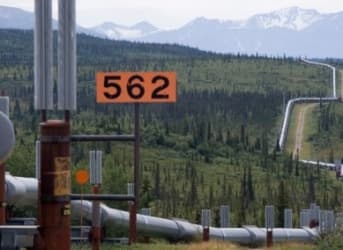A relatively high-profile natural gas pipeline cleared a key legal hurdle just as another saw increasing opposition from affected landowners.
The shale gas revolution has brought a wave of natural gas online in the United States, to be used in electricity generation, manufacturing, and petrochemical processing. But one of the major constraints in fully capitalizing off of the bounty has been the dearth of pipeline infrastructure. Much of the production occurs in Appalachia, but major consumers are on the East Coast, for example. Related: Natural Gas Prices To Crash Unless Rig Count Falls Fast
Following the prolific drilling has been a corresponding construction boom in natural gas pipelines. Still, more pipelines are needed to move gas around. Two key projects promise to connect both the northeast and the southeast to Appalachian gas fields.
First, is the Constitution pipeline, a 124-mile project that is expected to run from northeastern Pennsylvania to upstate New York and ultimately connect to a network servicing New England. Backed by Cabot Oil and Gas and Williams Partners LP, the pipeline promises to unlock Marcellus Shale gas for Boston and the rest of New England, which has historically suffered under high energy prices. Related: U.S. Shale A Marginal, Not Swing Producer
But as with any major construction project that has a large footprint, the Constitution pipeline faced legal obstacles from landowners along its path. On March 17, a U.S. District Court judge ruled that the pipeline had received the necessary permits from the Federal Energy Regulatory Commission (FERC), and since it serves the public interest, the court shot down legal attempts to block its construction from landowners. With the most difficult hurdles cleared, construction could soon begin.
A separate pipeline seeking to send shale gas from the Marcellus is facing similar legal challenges. The Mountain Valley Pipeline is a proposed 300-mile pipeline that will run from West Virginia to southern Virginia, connecting shale gas to a network of pipelines servicing Virginia and North Carolina. But locals in West Virginia that live in the proposed construction path are filing a lawsuit to halt surveying for the project. Related: Can Big Oil Keep Paying High Dividends?
Lawsuits against pipelines are a common occurrence, and are a major reason why oil and natural gas pipelines take years to build and often face delays. For this reason, oil drillers have increasingly resorted to the railways to move crude around the country. But that doesn’t work for natural gas. Just as the Constitution pipeline succeeded in doing, the Mountain Valley Pipeline will have to demonstrate to a court that exporting natural gas out of West Virginia serves the “public interest” and thus should be allowed to use eminent domain laws to acquire land. While tedious and seemingly arcane, these legal issues ultimately determine how much natural gas will flow out of the prolific Marcellus Shale.
By Charles Kennedy for Oilprice.com
More Top Reads From Oilprice.com:
- Oil Price Crash A Blessing In Disguise For US Shale
- OPEC Boasts About Pain In U.S. Shale
- Oil Prices Will Recover: Market Fundamentals Are Working


















